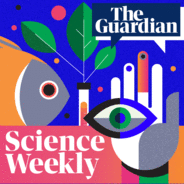Switzerland is leading the world in purifying its water of micropollutants, a concoction of chemicals often found in bodies of water that look crystal clear. They include common medicines like antidepressants and antihistamines, but have unknown and potentially damaging consequences for human and ecosystem health. In the second of a two-part series, Phoebe Weston travels to Geneva to find out how the country has transformed its rivers from sewage-filled health hazards to pristine swimming spots. She tells Madeleine Finlay how a public health disaster in the 1960s spurred the government to act, and what the UK could learn from the Swiss about taking care of a precious national asset.. Help support our independent journalism at theguardian.com/sciencepod

Wissenschaft & Technik
Science Weekly Folgen
Twice a week, the Guardian brings you the latest science and environment news
Folgen von Science Weekly
300 Folgen
-
Folge vom 10.04.2025Streams of medicines: how Switzerland cleaned up its act
-
Folge vom 08.04.2025Streams of medicines: what’s hiding in the UK’s waterways?The UK is known for its national parks: areas of outstanding natural beauty with rolling hills and crystal-clear streams and lakes. But research has shown that England’s most protected rivers are full of pharmaceuticals. In episode one of a two-part series, biodiversity reporter Phoebe Weston tells Madeleine Finlay about the problem of chemical pollution in our waterways, and how it could be contributing to what the World Health Organization has described as ‘the silent pandemic’ – antimicrobial resistance.. Help support our independent journalism at theguardian.com/sciencepod
-
Folge vom 03.04.2025‘Parasites should get more fame’: the nominees for world’s finest invertebrateInvertebrates don’t get the attention lavished on cute pets or apex predators, but these unsung heroes are some of the most impressive and resilient creatures on the planet. So when the Guardian opened its poll to find the world’s finest invertebrate, readers got in touch in their droves. A dazzling array of nominations have flown in for insects, arachnids, snails, crustaceans, corals and many more obscure creatures. Patrick Barkham tells Madeleine Finlay why these tiny creatures deserve more recognition, and three readers, Sandy, Nina and Russell, make the case for their favourites.. Help support our independent journalism at theguardian.com/sciencepod










